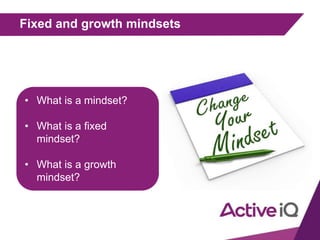
Fixed and growth mindsets.pptx
- 1. Fixed and growth mindsets • What is a mindset? • What is a fixed mindset? • What is a growth mindset?
- 2. What is a mindset? • Our mindset is the attitude we choose to adopt, and it can be changed. • It is to do with what we think we are capable of achieving. Our mindset is about our attitude to life and all its challenges. • People either have a fixed mindset or a growth mindset. ‘Just because some people can do something with little or no training, it doesn’t mean that others can’t do it (and sometimes do it even better) with training.’ Carol Dweck, Mindset: The New Psychology of Success
- 3. Growth mindset People with a growth mindset believe that most things can be achieved through hard work, practice and by not giving up when things get difficult. They know that some people might be particularly talented at certain things but recognise that for them this is just a starting point and that even these people need to work hard in order to improve on their talent. People who have a growth mindset achieve more in life, whether in sport, music, acting, business or exam results. They achieve more because they have resilience. When things get hard they don’t give up; they hang in there, keep practising and give it another shot until they get it right.
- 4. Fixed mindset People with a fixed mindset believe that their basic skills and qualities are more or less set from birth and there is not a lot they can do about it. They adopt the attitude of ‘It’s okay for her, she’s brainy’, ‘He’s artistic’, ‘He’s sporty’ or ‘She’s musical’. If they are not good at something from the word go, then they don’t see the point in putting in the effort to learn it.
- 5. Transferable skills What are transferable skills? List as many examples as you can think of.
- 6. Transferable skills Transferable skills are: Skills and abilities that are relevant and helpful across different areas of life, for example, socially, professionally and at school/college/university. Transferable skills include: • Personal motivation. • Organisation. • Time-management. • Teamwork. • Leadership skills.
- 7. Hard and soft skills What are hard and soft skills? List as many examples as you can think of.
- 8. Hard skills Hard skills are quantifiable, often technical and learned at school/college/university, or by doing particular work over a period of time. Knowing a particular hard skill makes you in demand. Hard skills may be the difference between getting or not getting a particular job over other candidates. For example: • Fluency in a foreign language may enable you to apply and secure a role requiring international travel for work. • Skill or knowledge of particular software will enable you to seek a role specifically working on that software package.
- 9. Soft skills Soft skills (also known as employability skills) are the skills and attitudes that enable you to get along with colleagues, to make critical decisions, solve problems, develop respect and ultimately become strong ambassadors for an organisation. For example – good interpersonal and communication skills will enable you to: • Participate effectively as a member of a team. • Satisfy customer expectations. • Negotiate. • Make decisions. • Manage your time efficiently. • Take responsibility. • Work effectively with other employees…
- 10. Individual strengths and weaknesses Why is it important to highlight your strengths? Why is it important to highlight your weaknesses?
- 11. Strengths and weaknesses Exploring strengths will give an indication of the following: • What skills and experience do you already possess? • What are you able to do well already? • What do others see as your strengths? Exploring weaknesses will give an indication of the following: • What areas of development could you improve on? • Is there a lack of experience that may be needed for a long-term career? • What areas are done badly? • What should be avoided? • Do friends or family think there are weaknesses that you do not agree with?
- 12. SWOT analysis
- 13. Planning and reviewing cycle Identify areas to develop. Plan development needs. Action development. Reflect and review outcomes of development.
- 14. Planning and reviewing cycles Why are planning and reviewing cycles important within personal and professional development?
- 15. Planning and reviewing cycles – benefits • They provide the opportunity for self-reflection. • Ensure SMART goals are put in place to ensure development is measurable. • Encourage significant others to support, for example, managers. • Ensure you keep up to date with industry standards and new opportunities.
- 16. Can you now: • Explain the importance of the planning and reviewing cycle within personal and continuing professional development? • Define continuing professional development? • Explain the benefits of continuing professional development (CPD) for self, clients and organisations? • Explain how to reflect on your work and highlight ways of improving skills, knowledge and practice? • Describe how to work with others to evaluate your skills, knowledge and practice? • Explain how to plan your continuing professional development? • Explain the contribution that a workplace’s performance appraisal and development processes can make to your continuing professional development? • Outline the roles and support available from the national governing body and professional associations to support continuing professional development? Learning review
- 17. #BeginWithBetter
